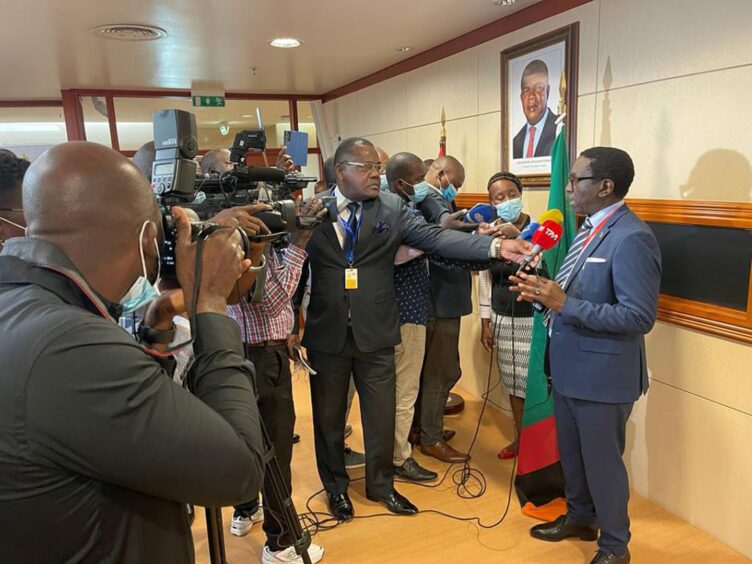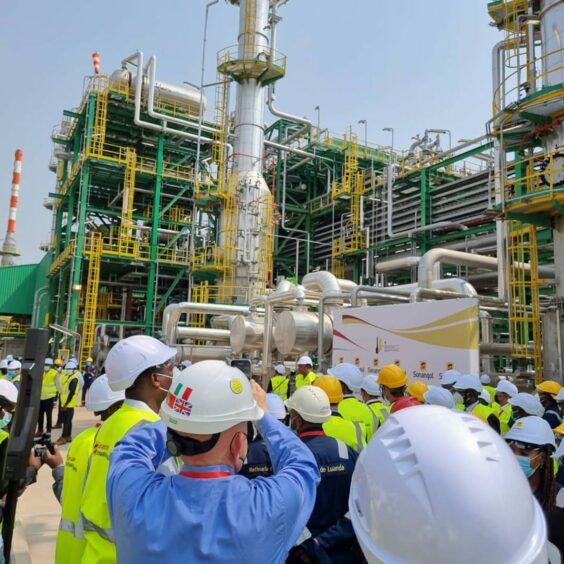
Angola has inaugurated a new unit at the Luanda refinery, with Zambian officials expressing their interest in securing fuel supplies from their neighbour.
Eni oversaw the modernisation of the new unit. This will increase gasoline production at the plant to 450,000 tonnes per year, a quadrupling of current capacity.
Angolan President João Lourenço attended the ceremony, alongside Eni COO Guido Brusco. Eni signed a memorandum of understanding (MoU) with Sonangol to support the expansion and modernisation work at the refinery.
Eni said its work would reduce emissions, with power from recycled gas and hydrogen from the new unit going into the combined cycle.
Brusco said completion of the work demonstrated “the long and fruitful strategic partnership between Sonangol and Eni”. The Luanda refinery “can count on Eni’s commitment to continue supporting future possible expansion and modernisation efforts”.
Eni said it had also provided training for more than 100 Sonangol employees. The company began work on the project in June 2019.
Zambian interest
Also at the refinery launch was Zambian Minister of Energy Peter Kapala. The Zambian politician is visiting Angola in order to push forward plans for a pipeline. The countries are working on a $5 billion pipeline project, which would run from the Lobito refinery to Lusaka, carrying products.
Kapala visited the Luanda refinery on July 7 before going on to hold talks with Angolan Minister of Mineral Resources, Oil and Gas Diamantino Azevedo.
The Zambian minister set off for the Benguela province today. There he plans to inspect the Lobito refinery and the local ports.
Construction of the multi-product pipeline would take around three years. Sonangol and Zambia’s state-run Industrial Development Corp. (IDC) would build the pipeline.
The Zambian minister visited Tanzania recently. While there, the official finalised plans for another products pipeline that would run from Tanzania to Zambia.
The plan consists of a $300 million investment in a diesel pipeline. Zambia has also raised the possibility of building a gas pipeline from Tanzania.
“The New Dawn government is extremely concerned about the continued increase in fuel prices and is doing everything possible to ensure a reduction of the same,” he said. Building pipelines “will be the key strategy in our country’s long-term goal of stabilising diesel supply and maintaining favourable pump prices”.
On the road
In the short term, Zambia is working on increasing the delivery of petroleum products by road from Angola. While the two countries share a 1,100 km border, there are no road links.
Kapala said a number of plans were underway to change this, saying there were plans to build connections in the Jimbe, Sikongo and Shangombo districts.
The minister said an Angola company, MPCP, in a joint venture with Edenvale Investments Zambia, had made an unsolicited offer to build, operate and transfer a road. This would run from Solwezi, in Zambia’s North-Western Province, to the border post at Jimbe. From the border, the road would run to Cazombo, in Angola’s Moxico Province.
Building reliable roads, Kapala said, would allow Zambia to import cheaper Angolan fuel by tankers. This would be a stop-gap measure until the countries have built a pipeline.
The minister has talked of Angola’s plans to ramp up its refining sector. He noted plans for a 100,000 bpd refinery in Cabinda, a similar sized plant in Soyo and a 200,000 bpd facility in Lobito.
The government has set petrol prices in Zambia at 26.75 kwacha ($1.6) per litre.

 © Supplied by Zambian Ministry of
© Supplied by Zambian Ministry of